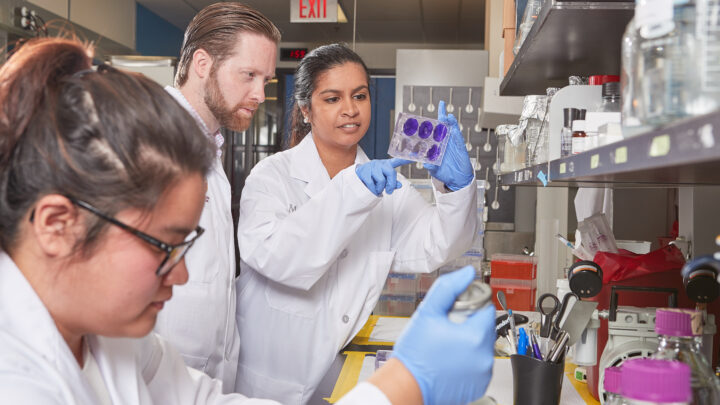Overview
Since its inception in 2007 through an unprecedented gift from Hamilton businessman Michael G. DeGroote, the IIDR has brought together a successful team of over 30 principal investigators and 2000 trainees, all of whom are committed to delivering new knowledge and solutions to some of the most pressing challenges in infectious disease. Our members span a variety of disciplines ranging from medicine and biochemistry to mathematics, anthropology, and engineering, among others. Through collaborative research that spans the lab and the clinic, our team is dedicated to finding new treatments and preventions to control infections that have devastating impacts on health.
McMaster University’s cutting-edge genomic, imaging, Biosafety Level 3 (BSL3) and animal facilities enable the IIDR’s fundamental and applied research initiatives. The IIDR’s core supporting infrastructure – the Centre for Microbial Chemical Biology – is a 7,000-square-foot laboratory that features six integrated labs, allowing chemical biology research to be conducted in one central location.
Research at the IIDR
The breadth of research initiatives at the IIDR is large, reflecting the complexity of global challenges in infectious disease research and clinical practice. Further, the IIDR continually advances its research objectives to align with the evolving infectious disease landscape. Such initiatives fall into three general categories:
Information Box Group

Microbial and Antimicrobial Research
Including fundamental research into the causation, detection, and treatment of antibiotic resistance, the discovery of new antibiotics and antibiotic alternatives, and the study of microbial physiology and microbial evolutionary biology.

Host-Pathogen Interaction Research
Including the study of immunity and pathogenesis, microbiome research, and the mathematical modelling of infectious disease from the level of molecules to populations.

Research into New Technologies
Including research that translates into the development of novel inventions and innovations in drug discovery, diagnostics, vaccinology, and materials science.


